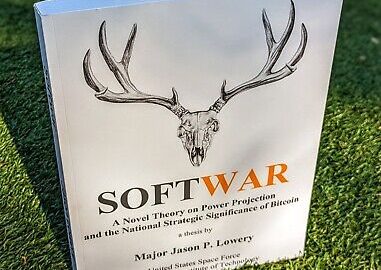Despite being a graduate thesis, a 350-page report on Bitcoin has surprisingly become popular on Amazon.
The paper, titled “Softwar,” was written by a U.S. Space Force major named Jason Lowery and explores the potential of Bitcoin as a military-grade solution for securing information. The report suggests that nation-states could use Bitcoin as a powerful cyber-security tool, marking a departure from the mainstream use of Bitcoin’s network as a financial solution.
Lowery’s research for the paper was conducted during a 6-month fellowship sponsored by the Department of Defense at the Massachusetts Institute of Technology. Titled “Softwar: A Novel Theory on Power Projection and the National Strategic Significance of Bitcoin,” the paper represents the culmination of his academic research. While a thesis may not typically be considered a page-turner, Lowery’s work on Bitcoin has gained widespread attention on Amazon.
According to Lowrey’s Amazon bio, he has advised senior U.S. officials on Bitcoin-related policy in offices related to the president, Secretary of Defense, and the Joint Chiefs of Staff. Although “Softwar” is not currently ranked within the top 500 books on Amazon, Lowery’s research on Bitcoin has gained significant traction and currently ranks second in both the technology and engineering categories on Amazon.
Lowery’s thesis spans over 350 pages and draws on multiple disciplines, including anthropology and computer science, to develop his “Power Projection Theory.” The theory suggests that the proof-of-work system that underpins Bitcoin’s transaction verification could be utilized by military powers to impose restrictions on bad actors without lethal force, instead using computational work to deter them.
The book argues that Bitcoin can serve as a “softwar” or electro-cyber-defense protocol, going beyond its current usage as a peer-to-peer electronic cash system. The system’s unique ability to physically constrain computers sets it apart from other software that can only logically deny them.
In the acknowledgments section of “Softwar,” Lowrey credits MicroStrategy’s Michael Saylor and Peter McCormack among Bitcoin’s most loyal proponents. However, the paper also highlights the potential threat to national security if the U.S. government fails to maintain sufficient reserves of Bitcoin, given its possible use as a cyber-security tool.
Lowrey argues that the U.S. risks forfeiting a strategically vital power and setting itself back in global power dominance without considering the stockpiling of strategic Bitcoin reserves or encouraging Bitcoin adoption.
It is worth noting that the DoD, Air Force, and MIT do not officially endorse Lowrey’s thesis, as disclosed in the book.
Despite this disclaimer, “Softwar” has received mostly positive reviews on Amazon, with most readers giving it five stars. However, whether the U.S. government will heed Lowrey’s warning regarding the importance of maintaining strategic Bitcoin reserves remains to be seen.
However, the U.S. government’s recent sale of seized Bitcoin for $215 million suggests that not all officials share Lowrey’s views.

